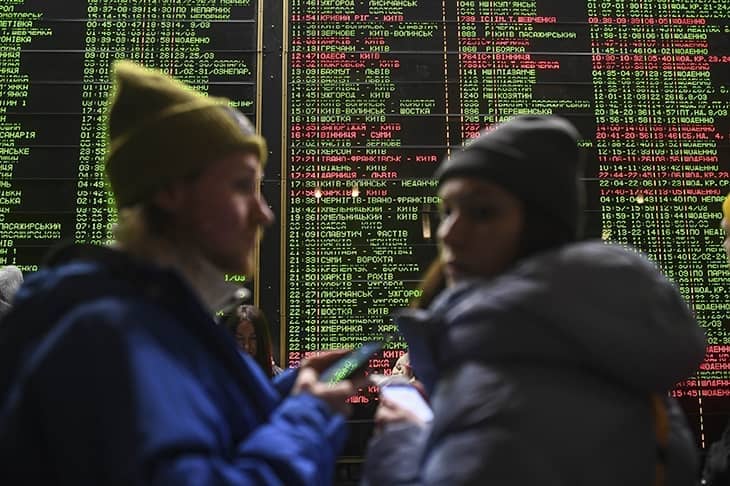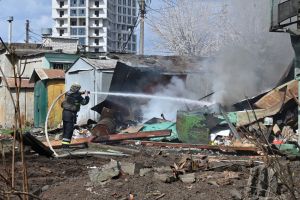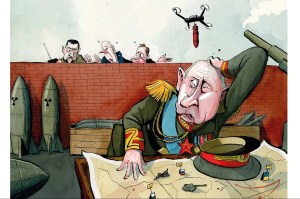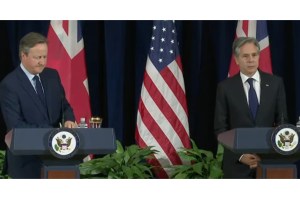I spent my last night in Kyiv in the “Presidential Suite” of a city hotel — what used to be known as the underground car park. The general manager, a man whose name I never knew but who I hugged tightly before leaving, had promised to make it a shelter for guests who hadn’t checked out by the time it was clear that war was looming. We stayed there with his staff, their young children and elderly parents, their dogs and cats too. It is still the home of the BBC staff who remain in Kyiv: the reporters and presenters you know as well as those whose roles are just as important but whose names you seldom hear.
Lying in my makeshift bed — soft rubber insulation pipes which I’d found in a corner next to my collection of whisky miniatures grabbed from the minibar — I dwelt on how much had changed. And how quickly. Just four nights earlier, I’d shared a beer with a group of young comics at an open-mic night. One had told me that the reason she hated Vladimir Putin was that he’d ruined her plans for a weekend of hot sex with a guy who was flying in from London. That, I fear, may be the least of her concerns now.
When I arrived in Kyiv to present BBC Radio 4’s Today program, I honestly didn’t think that war would come to the city. Russia may make a further incursion in the east, perhaps, or annex more land to create a corridor from Crimea. But I never imagined a full-scale invasion and aerial bombardment. When it became clear that this was what was happening, I knew I had to try to leave. And that I’d already left it too late for it to be an easy journey.
Air-raid sirens echoed as we packed our minibus, but other than that all seemed calm. Only when we reached the city’s outskirts did we see the first sign of Ukraine’s makeshift defenses: a chicane made from breeze blocks, a pile of sand covered in branches. Volunteer sentries stood at roadblocks which dotted the road. Sofia, our translator, could not hide her admiration as she saw the sandbags being filled and lifted. “Look at that strong Ukrainian man,” she squealed with pride.
Sofia had joined our convoy not just to translate and negotiate, but to flee with her four-year-old daughter. We made a brief night-time roadside stop where little Anna gave her grandma a hug — perhaps the last they’ll have for many years — before climbing on to the lap of one of our group. She was told to hide and keep very quiet when her mother talked to the soldiers: she didn’t know that she was leaving her country. In truth, in those last few stressful miles of our journey, I think she comforted us as much as we comforted her.
The traffic jam we hit was nearly thirty miles long. “We’ve been here two days already,” one woman told us. Some were abandoning their cars and possessions and walking to Poland. Migrants, she complained, were jumping the line. What she meant became clear at a refugee processing point.
Fighting-age Ukrainian men were turned back for trying to desert the war effort but there was another line, largely of young men from Africa, the Middle East and South Asia who had come to work and to study. They were being held in line by screaming soldiers with sticks. The women looked on and muttered angrily about people using war as cover to make their way into Europe. An Afghan man tried to make peace between the two lines — one all white, the other not — by explaining: “We are all refugees here.”
Reaching the border felt like a triumph, but presented us with a fresh dilemma. Our driver did not join us (he was of fighting age and his minivan was needed to pick up the next group who wanted to escape Kyiv). “You cannot walk,” Sofia insisted, saying that we’d end up standing in sub-zero temperatures for at least eight hours. But we had no choice. We told Sofia it was time for her to look after herself and her daughter (women with children were, quite rightly, being given priority at the border).
Rightly or wrongly, three letters on a press card — BBC — can clear routes that are blocked to others. So we picked our way through a heaving, jostling football crowd waiting impatiently for the gates to open. We were escorted into what resembled an abandoned battlefield with small groups huddled round fires they’d made to cope with the bitter cold. They were surrounded by discarded suitcases, half-eaten food and bags of human waste.
At the Polish border post itself, a noisy crowd of frightened people pleaded with guards. I came to understand that in war, doubt corrodes the soul as much as fear and hardship. With no translator, we had no idea if we were in the right line, whether we’d be here for hours or days or whether we’d make it out at all. It took the sun to rise, the soldiers to start to organize the line and my being recognized by Alex — a Lithuanian builder from Leeds — for hope to return. He joked that he’d only come to Ukraine to have cheap dental implants. He’d bitten off a whole lot more than he could chew.
Alex and I crossed the border together. I felt instant relief — and since then wave after wave of sadness and guilt that has yet to pass. I find it hard to watch my friends and colleagues still in Kyiv, sleeping in the “Presidential Suite,” preparing to report from a city that may soon be under siege. I feel pride in the work they’re doing.
But above all, I feel anger. Somehow, I — we — forgot the lessons of history, the lessons I was taught by my German-Jewish grandparents. They taught me to listen to what was said by dictators, rather than hoping they meant something else, something more sane. I remember standing on the Berlin Wall the day it fell looking down at the city from which they escaped believing — really believing — that the brutal division of Europe had ended. How wrong I was. How lucky I am. How impotent I feel.
This article was originally published in The Spectator’s UK magazine. Subscribe to the World edition here.


















